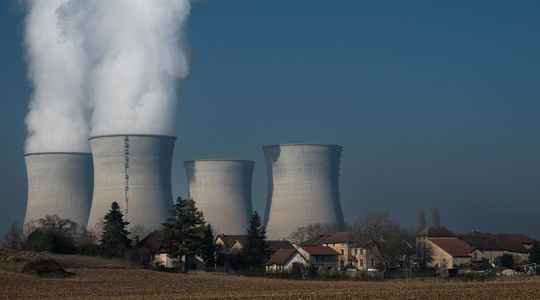It is a controversial text, presented in January by the European Commission. It classifies as “sustainable” certain investments for the production of electricity in nuclear power stations – which do not emit CO2 – or gas-fired power stations, provided that they mobilize the most advanced technologies. And, for the latter, that they make it possible to close much more polluting coal-fired power stations.
MEPs approved this Wednesday, July 6 the “green” label granted by the European Commission to gas and nuclear. Meeting in plenary session in Strasbourg, MEPs rejected a proposed veto against this project, by a majority of 328 votes. The objection received only 278 votes. The green light from the Member States having already been granted, the opponents announced that they would launch legal proceedings, the only means now available to block the initiative.
“I ask you not to reject this fragile compromise negotiated with care,” asked Czech Prime Minister Petr Fiala on Wednesday morning, whose country has just taken over the rotating presidency of the EU from France. “Nuclear power and gas from safe countries will be the only way for some member states to achieve our common climate goals in the years to come,” he said.
Pro and anti-nuclear activists demonstrate face to face
This classification, called taxonomy, must help to mobilize private funds in these projects. It is part of the EU’s objective of carbon neutrality by 2050. The taxonomy is a classification of sustainable economic activities, intended for private finance. The idea being, as Brussels specifies, to create a “common language that investors can use everywhere when investing in projects and economic activities that have a significant positive impact on the climate and the environment.”
By labeling the “green” sectors and therefore, in hollow, those which are not, this taxonomy will also have an enormous impact on the orientation of private and public capital. The inclusion of nuclear and gas will also allow both energies to benefit from European public initiatives, such as recovery plans.
The recognition of the contribution of gas and nuclear to the fight against climate change, based on the basis of expert reports, has aroused the anger of environmental organizations which denounce a “greenwashing” operation. The “green” label was previously reserved for renewable energies.
After the first demonstrations by environmental defense organizations on Tuesday, a few dozen pro and anti-nuclear activists demonstrated face-to-face this Wednesday morning to challenge MEPs on their arrival at the European Parliament. In the hemicycle, the anti-gas had also given voice during a debate on Tuesday, July 5. “How can we ask other countries to reduce their use of fossil fuels if we classify them as green?” asked Dutchman Bas Eickhout (Greens).
MEPs voted on an objection proposal, adopted on June 14 by the Economic Affairs and Environment parliamentary committees, synonymous with a veto against the text of the European executive. An absolute majority of 353 votes was required to block the Commission’s text. “No one is saying that gas and nuclear are green energies, but they are temporarily essential for the transition. We must use all the tools to do without oil and coal as a priority,” argued French MEP Gilles Boyer. (Renew).
A “green” label which has already received the approval of the Member States
As early as January, the NGO Greenpeace had for its part denounced the trajectory that the taxonomy was taking. “This version of the taxonomy is a greenwasher’s license. Polluting companies will be delighted to have the EU stamp of approval to attract investment to continue destroying the planet by burning fossil gas and producing waste radioactive”, estimated the organization.
The EU taxonomy “gives priority to renewables and energy efficiency”, recalled Financial Services Commissioner Mairead McGuinness, who came to defend her text in Strasbourg. But the EU executive believes that renewable energies alone will not be able to meet the growing demand for electricity due to their intermittent production. Hence the need, at least on a transitional basis, to also promote investment in stable and controllable resources such as gas and nuclear.
The “green” label for these two energy sources has already received the approval of the Member States. Only eight countries, including Germany, Austria and Luxembourg, expressed their opposition, during consultations led by the French Presidency of the Council of the EU, far from the “super-majority” of twenty countries necessary to block the project. France, which wants to relaunch its nuclear industry, and central European countries such as Poland, which must replace their coal-fired power stations, are behind the Commission.
